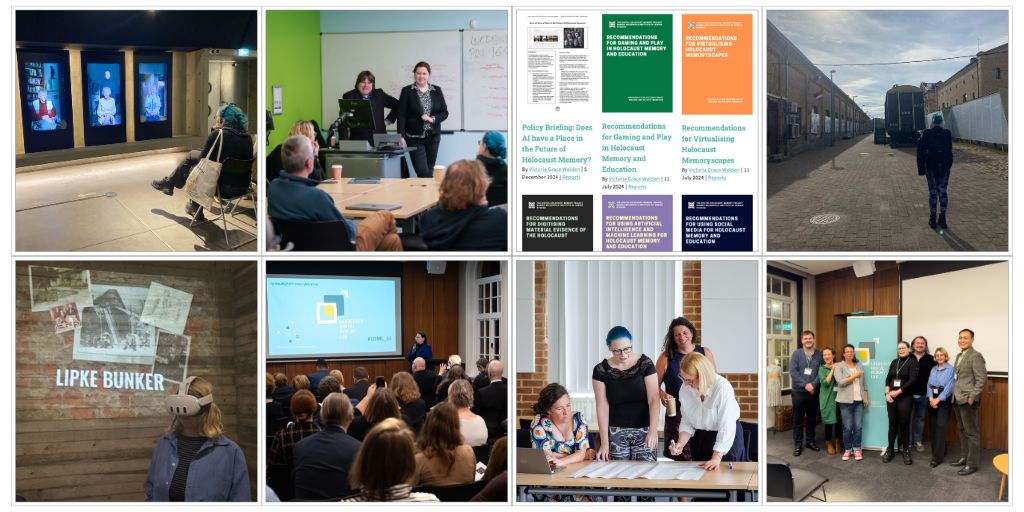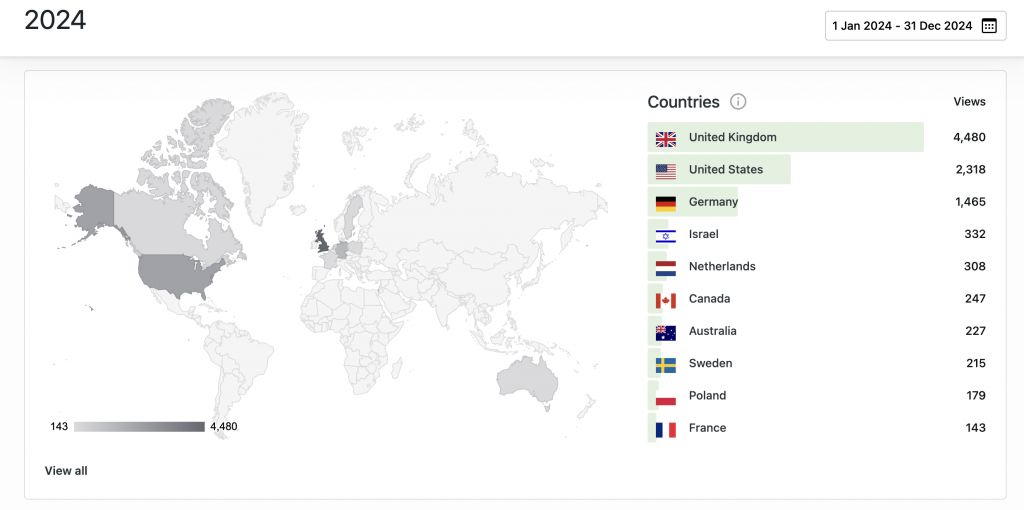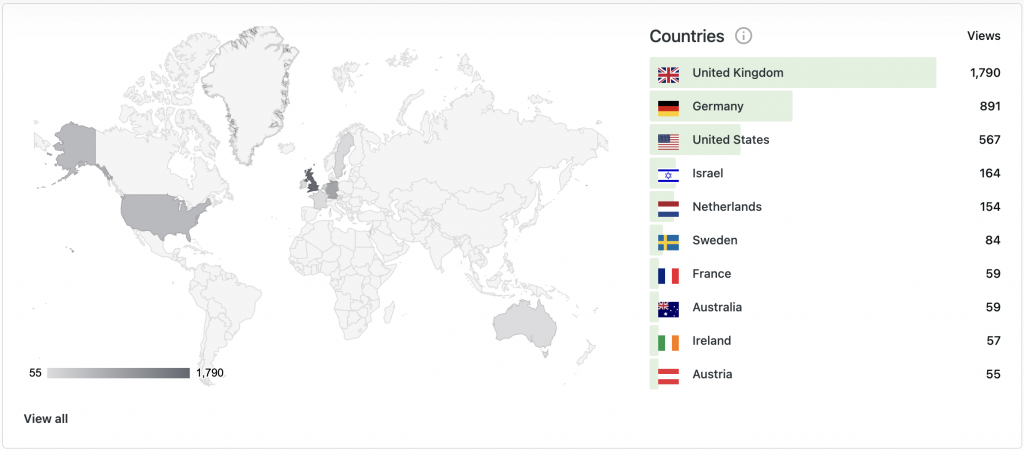
2024: A Year in Review
By Prof. Victoria Grace Richardson-Walden
The year 2024 will be unforgettable to us, as the year we launched the Landecker Digital Memory Lab. We look back at what we’ve achieved.
It was at a public lecture held at the Melbourne Holocaust Museum in April that we were finally able to announce the Landecker Digital Memory Lab was coming into existence. Since then, we’ve been non-stop!
My two-week residential at the museum also included co-hosting a symposium on ‘Preserving Truth in the Digital Age’ and led to us confirming the Melbourne Holocaust Museum as an official project partner. We’re looking forward to collaborating with them further. Read our ‘Spotlight’ piece on the museum to find out more about their digital work past and present.
The Melbourne trip was followed in September by further fieldwork in Riga, Latvia at the Žanis Lipke Memorial where we explored their use of VR.
Engagement with intergovernmental organisations, policymakers and funders was a dominant thread of our first few months, particularly with the hype about ‘AI’. In June, we hosted the workshop ‘Policy and Funding Sustainable Interventions in Digital Holocaust Memory and Education’ together with the Holocaust and the United Nations Outreach Programme.
The event was attended by Lord Eric Pickles, Chair of the International Holocaust Remembrance Alliance (The IHRA) and UK Special Envoy for Post-Holocaust Issues, his Chief of Staff and Secretariat for the IHRA, Sally Sealey, and representatives from the United Nations, the European Commission, Claims Conference, the Association of Jewish Refugees, the Commonwealth War Graves Commission, European Holocaust Research Infrastructure, UNESCO, and our funders the Alfred Landecker Foundation.
Global contributions
I was invited by the US State Department to speak on a panel called ‘Holocaust Denial and Distortion – New Challenges’, which focused on AI, Holocaust distortion and education in Bucharest in October.
The Conference on Holocaust Distortion and Education: Current and Emerging Challenges, National Measures in Place, was sponsored by the governments of Romania and the United States of America, with the support of the OSCE Chairperson-in-Office and the UK Presidency of the IHRA, and in consultation with the OSCE Office for Democratic Institutes and Human Rights.
More recently, I presented at an online workshop led by the IHRA’s Education Working Group and gave the opening talk at the IHRA conference ‘AI in the Holocaust Education, Research and Remembrance Sector’ at Lancaster House, London.
Research boost
The year also saw our team broaden (albeit temporarily!) with visiting researchers. We hosted our first International Junior Research Associate from the University of Chicago, Austin Xie, who spent 7 weeks with us in the summer. Read about his initial reflections and outcomes on how computer games could transform Holocaust education, taking a design approach to this dilemma.
Just before the Christmas break, we were joined by our first visiting researchers, Dr Mykola Makhortykh and Maryna Sydorova. Together we spent an intensive two weeks considering the implications of Generative AI on the future of Holocaust memory.
Their stay began with an informal symposium held in the Sussex Digital Humanities Lab, during which we discussed these issues and explored their data sets with colleagues from across the University of Sussex – from the humanities, informatics and life sciences.
It ended with two presentations – one on their research about Generative AI and the war in Ukraine, delivered as part of the Sussex AI seminar programme and another to the Media, Journalism and Communication research seminar series. Their stay showed just how much focused, collaborative research time can achieve as we said our farewells with the skeleton for a book proposal in hand and an initial idea for a workshop. Find out more about their thoughts on AI and the future of Holocaust memory in our Q&A blog.
We also continued to engage with wider academic communities and the heritage sector. In the summer, our Research Fellow Dr Kate Marrison led a discussion workshop with Latin American Holocaust museum and education professionals at the Memory Studies Association’s annual conference, in Lima, Peru.
The workshop included representatives from the Museo del Holocausto, Buenos Aires, Argentina; NEPAT, Brazil; Museu do Holocausto Curitiba, Brazil; and Casa Cultural Trude Sojka, Ecuador.
We hosted a workshop on ‘advancing digital innovation in memory’ at the International Council of Museum’s (ICOM’s) ‘Momentum’ conference in Tartu, Estonia.
We also engaged with the youngest generation of Holocaust education advocates through the Holocaust Educational Trust’s Ambassador Conference (AmCom) with Dr Marrison delivering a workshop focused on Holocaust education and social media.
New publications
During our first year as the Lab, we announced several new publications:
- A policy briefing written for delegates of the International Holocaust Remembrance Alliance ‘Does AI have a Place in the Future of Holocaust Memory?’
- Two academic journal articles (written before the Lab’s launch): ‘Imagining Human-AI Memory Symbiosis’ (co-written with Mykola Makhortykh) and ‘An Entangled Memoryscape: Holocaust Memory on Social Media’.
- Two magazine article: the first for Lernen aus der Geschichte (Germany) ‘Towards a Sustainable Networked Approach to Digital Holocaust Memory’ and the second for Teaching English Magazine (UK) ‘Artificial Intelligence, Artificial Literacies: English and AI. Is the English classroom the place to develop AI literacies’.
- The final two recommendation reports from the project that laid the foundations for the Lab’s goals, on ‘Virtualising Holocaust Memoryscapes’ and ‘Gaming and Play in Holocaust Memory and Education’.
Official launch and project partners
Of course, our most prominent event was our official launch at the Imperial War Museum, London on Monday 18 November. We were joined by more than 150 people in-person and online, with participants from the North and South Americas, Africa, Asia, Australia, across Europe, and Israel.
Speakers included Lena Altman, Co-CEO of the Alfred Landecker Foundation; Lord Pickles; Professors Michael Luck, Deputy Vice-Chancellor and Provost, and Cornel Sandvoss, Executive Dean of the Faculty of Media, Arts and Humanities; and Lord Khan of Burnley, Parliamentary Under-Secretary of State, Minister of Housing, Communities and Local Government.
At the launch, we announced our new consultancy programme, which will support our collaborating funders directly as well as offering bespoke support to specific projects. We are really glad to be working with the Association of Jewish Refugees and the Claims Conference to develop this work.
We also announced a collaboration with iRights.Lab, Germany and their platform for connecting all those working in our field – Digital Collective Memory. If you’re not yet a member, do sign up – we’ll be arranging some exclusive events through this community.
We also announced our nine project partners, with whom we will co-host our expos and design sprints over the next five years, ensuring we engage with a transnational range of creatives and tech professionals, as well as Holocaust memory and education specialists and academics.
We welcomed as our partners: the Auschwitz Jewish Center Foundation (Poland); Falstad Museum, Memorial and Human Rights Centre (Norway); Filmuniversitaet Babelsberg Konrad Wolf (Germany); KZ-Gedenkstaette Dachau (Germany); Melbourne Holocaust Museum (Australia); Museu do Holocausto Curitiba (Brazil); The National Holocaust Centre and Museum (UK); Terraforming (Serbia); and Herinneringscentrum Kamp Westerbork (the Netherlands).
Behind the scenes
As we rebranded and launched as the Landecker Digital Memory Lab officially, a tremendous amount of work was needed to retain our loyal, historic followers whilst widening our reach.
We have an established presence on LinkedIn (with page followers steadily rising towards 500 since launch), Facebook, Instagram, and BlueSky (which saw a tenfold increase in followers since our launch), and recordings of our events are available on YouTube. In the month of our launch, our website had almost 5,000 views.

Old Website Views January – November 2024, by Country

New Website Views November – December 2024, by Country
Behind our public activities is all the hidden labour of our team. Firstly, colleagues have begun development of our living database-archive, from creating the software to cleaning content, checking ethical reviews to indexing.
Secondly, our PR and Comms Manager, Mel Poluck and Digital Media Specialist, Steve Wang have worked hard to support our rebrand, drawing a phenomenal amount of press attention to the Lab’s work, and managing our new social media presence. Our launch was covered in the UK, Germany, Israel, and Switzerland.
Thirdly, there is the preparation for our first international expo, which we will host in June 2025, from securing venues to promoting the call for submissions, to attracting key contributors and reviewing submissions. This was certainly a whole team effort and continues to be!
Finally, there is the day-to-day running of the Lab by our fantastic Senior Project Officer Philippa Murnaghan, whilst carrying out all the essential administrative tasks that keep all our work packages on track, she also keeps everything from the inbox to compliance and the flow of coffee under control.
Our birth year, 2024, was packed full of research initiatives, fieldwork, speaking engagements and connection-building. We are continuing the momentum we have built and look forward to revealing more about our developments and achievements in 2025.